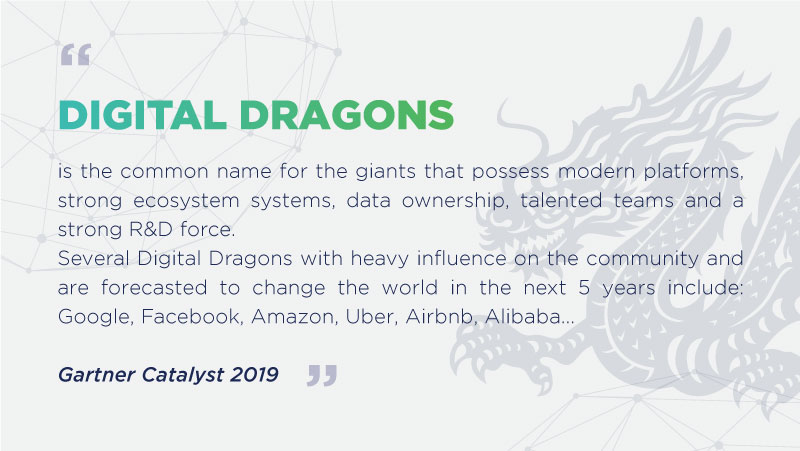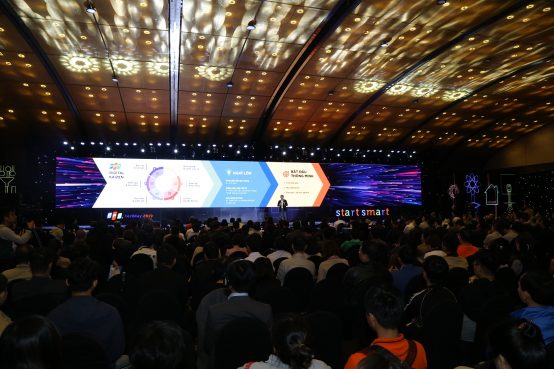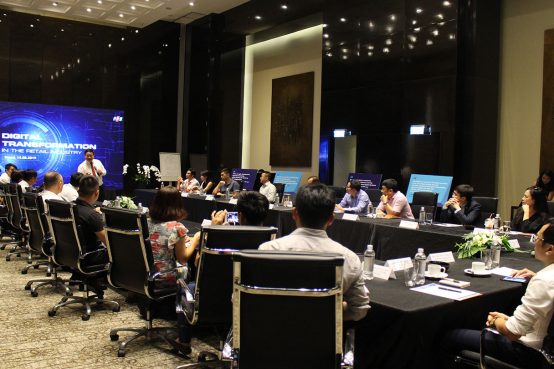Joining the discussions with Gartner’s top experts and more than 800 CIO, CTO from world leading companies is Mr. Le Hung Cuong, Director of FPT Digital Academy who shared with us several highlight’s from this year’s Gartner Catalyst’s conference.
The rise of Digital Dragons
In today’s digital age, every job has become a digital job, products become platforms, services become ecosystems. Digital Dragons is a newly coined term that was popularized at the Garner Catalyst 2019 conference. This is the common name for the giants that possess modern platforms, strong ecosystem systems, data ownership, talented teams and a strong R&D force. Examples include companies such as Google, Facebook, Amazon…are tech companies and multidisciplinary corporations that are hugely influential in the community.
Mr. Dave Aron, Gartner’s Vice President, commented that the growth rates of digital dragons are 2 or 3 times higher than other top 500, even top 100 companies in the world. According to a survey of 500 COOs, 64% of them believe that in the next 5 years these Digital Dragons will participate in and change the nature of their work.
Particular attention should be paid to Digital Dragons from China. Only 5 years ago, Digital Dragons were mostly American companies. Yet by 2018, more than half of the list of top 20 Digital Dragons are companies from China. According to the assessment of Gartner experts, this is a game changing catalyst in digital transformation in the next few years.
To overcome challenges of the digital age, Mr. Dave Aron suggested that every company should begin a partnership with these Digital Dragons.
As FPT representative at the conference, Mr. Le Hung Cuong – Director of FPT Digital Academy, said that FPT is currently on the right path and has already collaborated with many countries on the Digital Dragons list as a stepping stone towards realizing the corporation’s goals of becoming digital transformation pioneers.

Overcoming the fear of being wrong in business
Most companies are currently undergoing innovation and digital transformation efforts and we have all heard the same slogans: try and fail, if you fail then fail fast. Failures is essential for successful innovation. But human nature is afraid of failures and the obsession about not failing exists in every company. This is the antibody that destroys innovative projects.
“If you want to innovate, you need to identify the shortcomings that lead to the failure, not success,” said Mrs. Mary Mesaglio, Vice President of Gartner, in the 2019 Gartner Catalyst conference’s closing speech.
According Mrs. Mesaglio, companies should not use the word “failure” but instead say “learn and experiment”. Mrs. Mary said: “The reality is that everyone is afraid of failures, as failures mean being punished. These two things usually go together. How to innovate is similar to how you do science. Science researchers are never punished for failed experiments. They are only punished when they’re dishonest about the results and when they don’t experiment. That’s why businesses should learn to apply the scientific method to their innovation mindset.”
On failures, the Gartner VP also said that not every failure is a bad thing. There are failures that are considered good if you learn from them. There’s also failures that are good if they test what you haven’t researched before. The worst type of mistakes is when you don’t acknowledge, analyze and study it thoroughly afterwards.
Mrs. Mary Mesaglio also gave some advices to organizations undergoing innovative changes. “For innovation projects, imagine you’re at a point 12 months from now when the project has finished. If the project is not successful at this point then imagine the reasons for its failures. What will happen next? The reason we should do this at the early stages it’s because this is when people are the most open and honest about everything that can affect the project. Additionally, organizations often use the cost of the project as motivation to increase efficiency. However, the cost that we should promote is the cost of not innovating not vice versa. This is a much larger expense than the cost of doing the innovation project.

Agreeing with Mrs. Mesaglio’s opinions, Mr. Le Hung Cuong observed that “The advices from Gartner experts are very useful and can be applied within FPT in our consulting process for clients on innovation and digital transformation projects. The digital transformation team also needs to promote the project with communication campaigns to make sure everyone in the company, from the top leader to employees, understands that failed experiments are completely normal. If not we do not have failed experiments, it means the innovation unit has not experimented enough and have not accepted enough risks to be as innovative and creative as they could be.”
In a world where technology is changing faster than ever, establishing an innovation mindset in businesses model after the scientific method is essential to creating outstanding products, a strong brand and a strong position in the global market.



